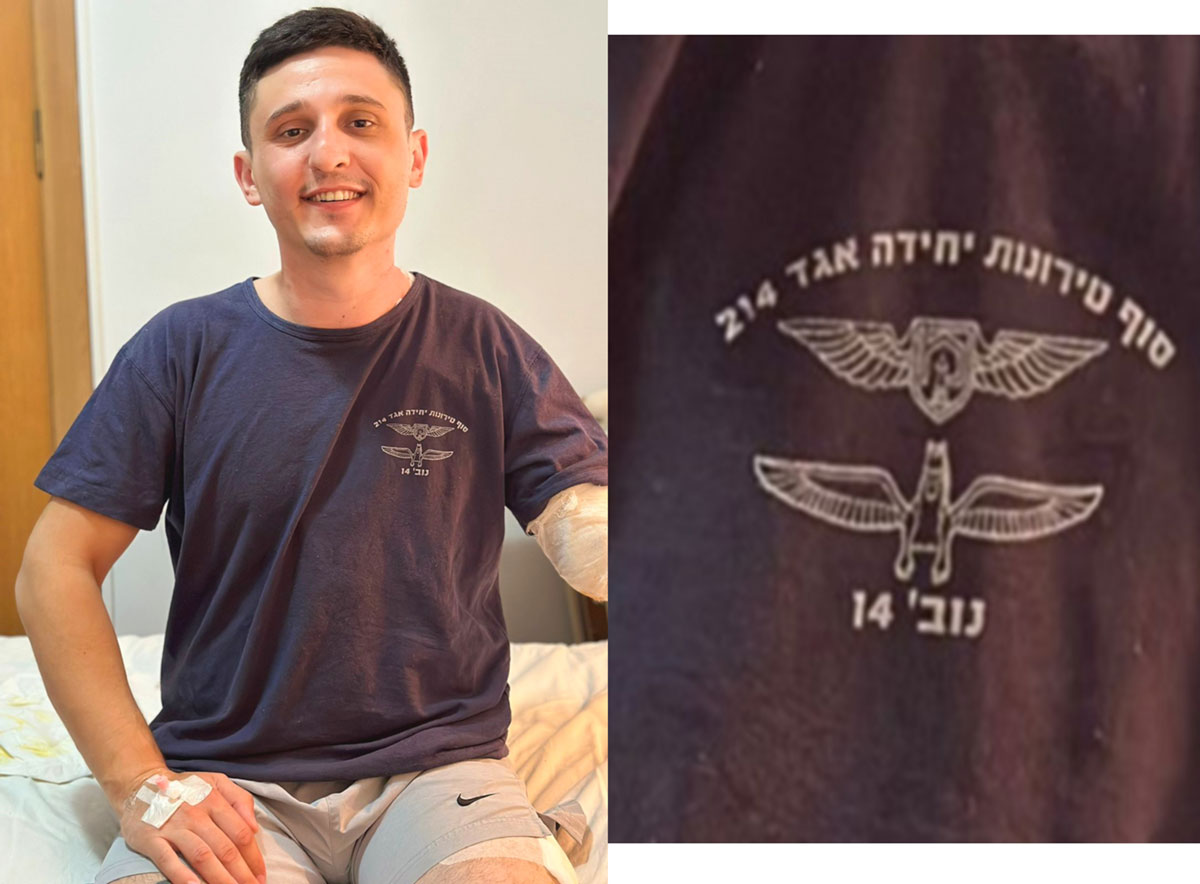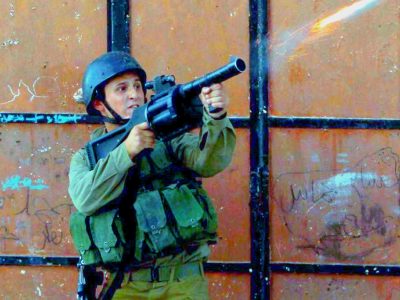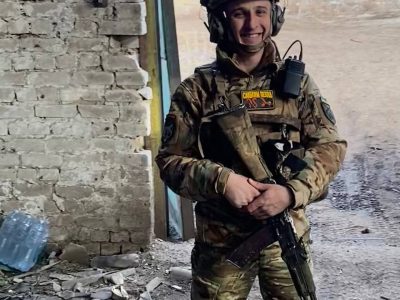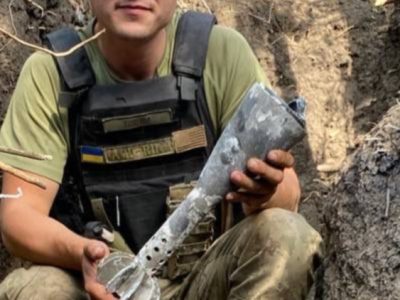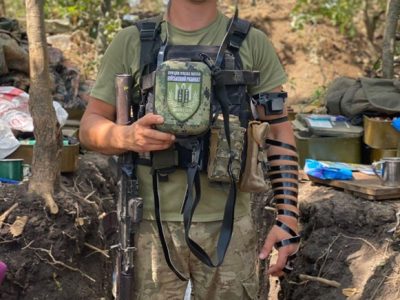Kyiv Jews defending Ukraine
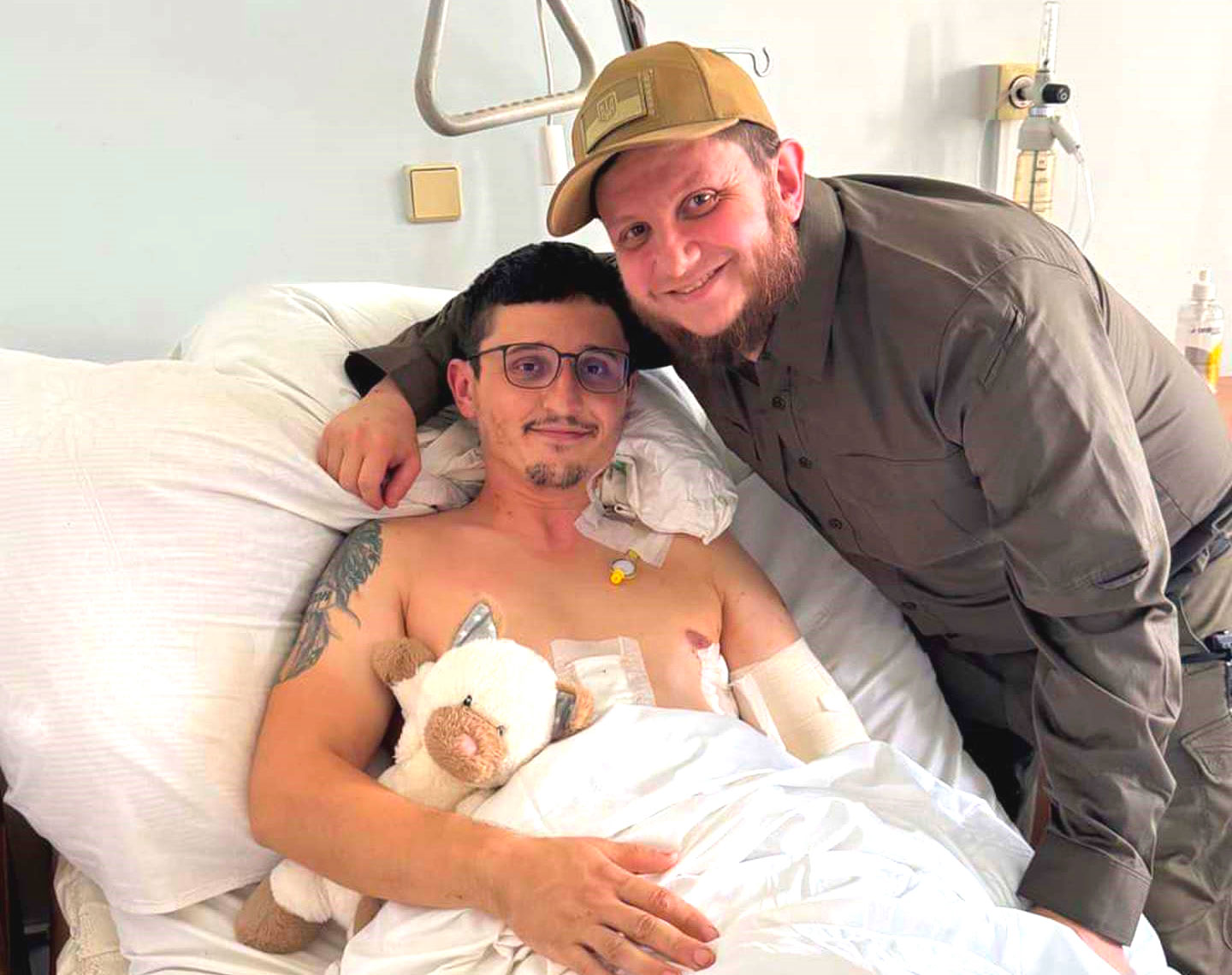
Two friends, graduates of a religious Jewish school in Kyiv, defend Ukraine, helping repel Russia's aggression. They also keep Israel on their minds and talk about the future of Ukrainian-Jewish relations after the war.
Igor (Yakiv David) Tish, aged 29, and Akiva Oleksandr Gilgur, aged 36, have been friends since childhood. Due to the age difference, they look like a younger and an older brother and treat each other accordingly.
They grew close when studying in the Orach Chaim Jewish gymnasium in Kyiv's Obolon district. Opened in 1990, this was Ukraine's first public school with subjects such as Hebrew and Judaic traditions. It was set up by Akiva Oleksandr's father, Kharyton Gilgur, and Rabbi Yaakov Dov Bleich and supported for many years by the Jewish Confederation of Ukraine and Ukraine's Ministry of Education.
"Igor Tish lived in the boarding house of our Jewish school from the age of five for family reasons, as his mother lived in a suburb. He grew up there, a cute kid who ran around before us, helping everyone. Igor went to Israel after school, served in the IDF, and returned to Ukraine. He decided to volunteer for army service after Russia's attack on 24 February 2022 and took the second oath," Gilgur says about his friend.
For over two years, Tish fought on the front lines in the 23rd Rifle Battalion of the Armed Forces of Ukraine (AFU) in different areas in the Donbas. Meanwhile, Gilgur set up the mass production of drones for the Ukrainian army in Kyiv and, in parallel, worked as the head of the Karlin-Stolin Hasidic community in the Podil district of Ukraine's capital.
In September 2024, Tish, an AFU platoon commander, was seriously injured while protecting two of his soldiers from a Russian drone strike. He lost half of his left arm. He came to after a drug-induced coma in a Kyiv hospital. "If you're here, everything will be fine," Tish said when he saw his childhood friend Gilgur beside him.
"We are encouraging everyone to visit Igor not all at once, but gradually, every day," Gilgur explained over the phone. He is in charge of organizing public assistance for Tish.
A Jewish platoon commander in the Armed Forces of Ukraine
Tish shares his story, speaking from the Feofaniya Hospital in Kyiv: "After school, I knew I wanted to serve in the army, so I went to Israel in 2012, studied Hebrew for six months, worked a little, and was called up to the Israel Defense Forces (IDF) in November 2014. I took a special training course in artillery intelligence there to get into an elite combat unit, serve there, and return to Ukraine."
Tish served in his unit for 2.5 years until 2017, participating in counterterrorist operations in Judea and rising to senior sergeant. "But our main task was in northern Israel. We were trained to use camouflage techniques and carry out raids into enemy territory in Lebanon and Syria. My special forces training was comparable to the level of special forces subordinated to the Chief Intelligence Directorate of Ukraine's Ministry of Defense. I was capable of performing any task," Igor says.
However, his IDF experience was not in demand directly in the Ukrainian army. "I didn't get into the artillery. In the first days of the war, when the military command was in chaos, I stood in a line of 200 people at the enlistment office and was told it was like a drum spinning in the casino, i.e., it was determined by chance. I was assigned to a rifle battalion and had to get used to using ex-Soviet weapons. But I was ready for anything."
Igor's battalion did not have to participate in defensive battles for Kyiv in late February and early March 2022 as it was still in the process of formation. But they were the first to enter Bucha. "We were deployed between Irpin and Bucha; the Russians left the day before. I saw the dead on the streets; people began to carry out the bodies of the dead and clear the debris. The bodies of Russian soldiers and the dogs they killed were still lying around. The locals talked about the atrocities and robberies committed by Russian soldiers from Buryatia and the Far East," Tish recalls. His battalion patrolled the borders of the Kyiv region in case Russian troops ventured to invade again.
"Three months later, we were sent to Donbas for the first time, close to Maryinka near the village of Novomykhailivka. We were there on the front line starting from June 2022. We in the military have this belief that if you find yourself in the Donbas once, you will always stay there. That's how it turned out. We were shocked by the force with which the Russians shelled us from aircraft and artillery and attacked us with vehicles and infantry. We were equally impressed by how furiously our troops repulsed all their assaults. Ours was a fresh battalion then; it was hard; the battalion was not technically or logistically ready initially, but everything was organized later.
"We were among the first to use ground-based drones, mine-laying systems, and machines for blowing up Russian bunkers. There were many losses; we stayed there without rotations for a year and nine months, defended ourselves, and attacked. In September 2023, we were relocated to the Pavlivka-Novodonetske area. In 2024, we held the front in the Serebriansky forest near Kreminna. The Azov Regiment fought alongside us; we were their left flank."
Did Tish's fellow soldiers know that he had come from Israel and had combat experience in the IDF? "Initially, there were jokes: look, he served in the IDF. And I was looked upon as an oddity. When asked who had combat experience, I said I did and was appointed unit commander and then platoon commander. I understood that I could help with my Israeli experience there. I trained my soldiers, gave the right orders, and won the trust of the people. My guys even joked: 'Our commander is a Jew, and our platoon is a separate state of Israel.'"
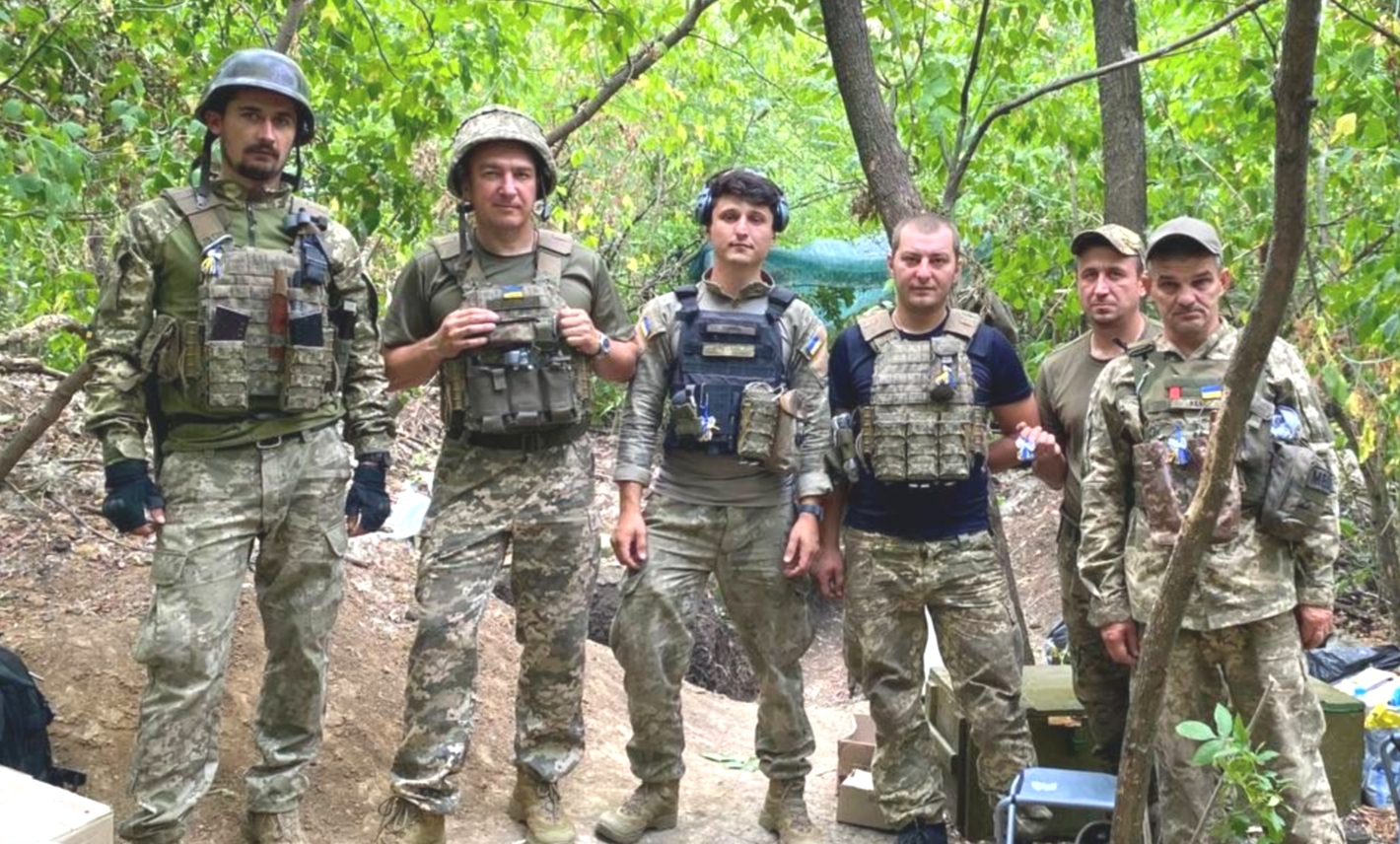
"Now I am a sergeant, waiting for the rank of lieutenant."
Igor was seriously wounded two days before the battalion left its positions in the Serebriansky Forest. "I came to the guys to replace them on guard and asked if the anti-drone jammer was working. They told me: 'The battery is dead; the command knows about it but is not doing anything.' Right then, I heard a drone approaching. Everyone lay down. I jumped to the jammer to try and turn it on. As I jumped back, we were hit by a drone loaded with explosives. It turned out that I covered two soldiers in my jump, while another soldier who was around the corner died from shrapnel."
Tish believes that the mass use of drones on both sides of the front fundamentally changes the course of military operations. But Russian troops have more drones and people where needed. "We see a lot of drones directly engineered to kill people. This is no longer war; this is destruction. And we just have fewer drones. We heard drones fly by every day. Groups of 4-6 drone operators worked against us. But a properly built defense with anti-drone jammers makes it possible to resist them. The Ukrainian army now has more experience in drone warfare and anti-drone operations than does the Israel Defense Forces," Tish says.
"We heard drones fly by every day. Groups of 4-6 drone operators worked against us. But a properly built defense with anti-drone jammers makes it possible to resist them. The Ukrainian army now has more experience in drone warfare and anti-drone operations than does the Israel Defense Forces," Tish says.
Israel and Jews on the Donbas front
Tish also shares about the attitude of his AFU comrades-in-arms toward Israel and Jews: "I have many friends and colleagues from the IDF in Israel. We keep in touch during the war with Russia. They sent two big bags of medications, which helped me and my guys a lot in the battles. Ukrainian soldiers highly praise Israeli tourniquets and first-aid bandages used in case of injury. Many talk about Israeli instructors in some parts of the Armed Forces. I keep hearing about help from the Israelis. Not once did anyone speak ill of Israel. They asked me why I left Israel, a highly developed country," says Igor, dressed in a T-shirt with the emblem of the IDF combat unit in which he served in Israel.
"Manifestations of anti-Semitism? In general, no one cared that I was a Jew and had served in the Israeli army. I became a commander, showed myself to be a good commander, and people followed me. When we were holding the front next to the Azov regiment, I found out that they had a unit commander, a Jew with experience serving in the IDF. The Third Assault Brigade, which separated from Azov, has a very respectful attitude to Jews and other ethnic minorities; they have punishment for saying bad words about nationalities".
I interrupted Igor by saying that I heard there were many ultranationalists in the Third Assault Brigade. Igor also interrupted me, speaking very emotionally and even sharply: "I am also ultranationalist! I want Ukraine to win and more Russian soldiers to die. I am a Jew; I live in Ukraine and consider it my country. If we talk about nationalism at the time of fascism, with only one nation being singled out, we do not have anything like that. People here simply love their country. This is patriotism."
"I am also ultranationalist! I want Ukraine to win and more Russian soldiers to die. I am a Jew; I live in Ukraine and consider it my country. If we talk about nationalism at the time of fascism, with only one nation being singled out, we do not have anything like that. People here simply love their country. This is patriotism."
Aid to the needy and drones for the AFU
Gilgur hugs Tish in the hospital and tells him: "You have done your share of fighting." As the more experienced "older brother," Gilgur knows you need to be next to the wounded as depression may strike again after leaving the hospital.
Gilgur has a degree in circuit engineering from the Kyiv Polytechnic Institute. "I've been interested in drones since 2016. We have our own lab, where we started to produce more drones after the outbreak of the war, sending them to the guys on the frontline. Rather than supplying the drones, we are now developing new technology that other laboratories can use to produce drones in large quantities. For example, we are professionally developing ballistic, anti-Shahed, and self-targeting drones.
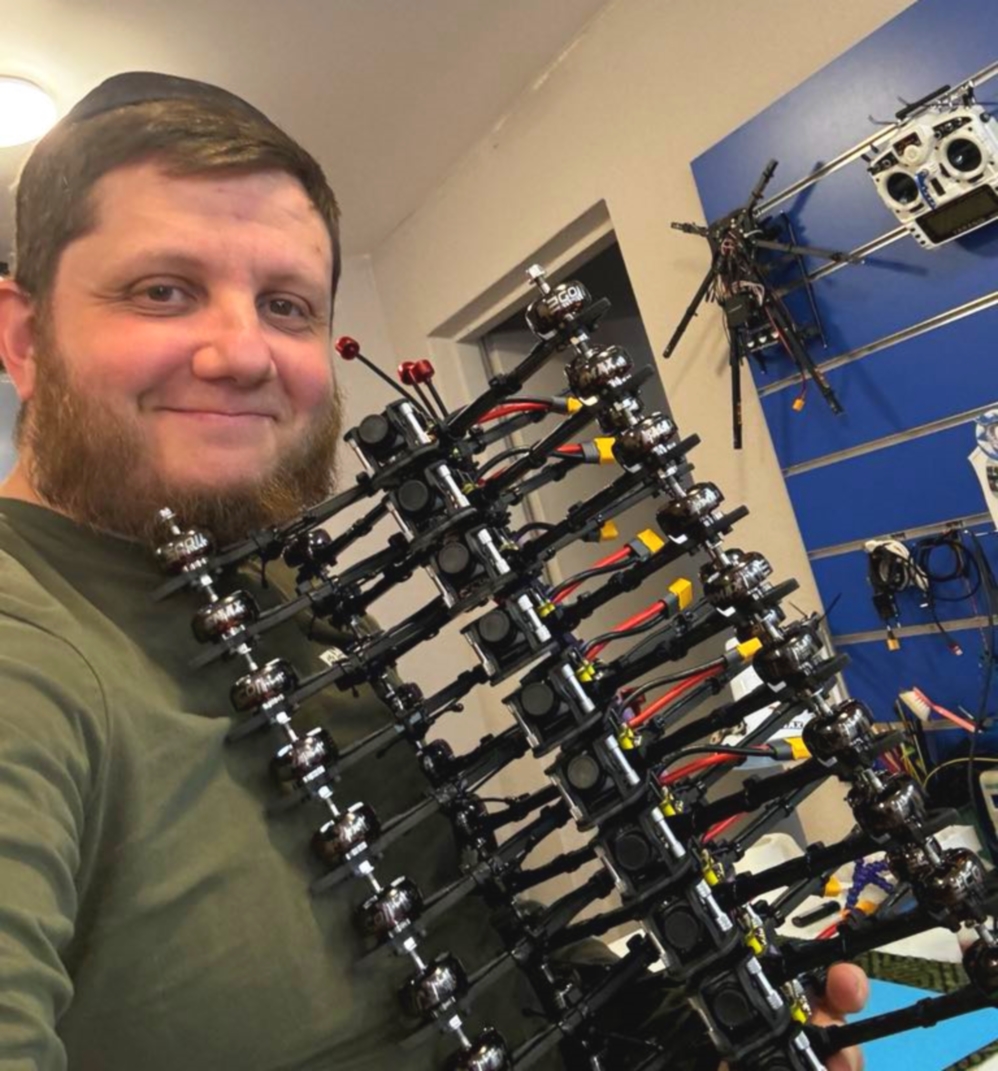
"One option is for brigades from the front to contact me directly when they need specific drone models. We sometimes even raise funds to produce them and deliver them to the brigade. The second option is for us to work with the Chief Intelligence Directorate and the Security Service and supply them with technology they use to produce drones themselves," Gilgur explains.
In parallel with working for the military industry, he gathers people for Jewish holidays in a religious community in Podil and helps older people with food kits. "As far as drones are concerned, I do what I can. Initially, I soldered them myself, while now I deal more with organizational issues. From drones to helping people, from organizing prayers and Torah lessons to helping the Ukrainian army," Gilgur says, listing his wide range of interests.
How do peaceful work and charity mesh with military and frontline activity? "Jews can explain this: we make drones not to kill Russian soldiers but to protect Ukrainian soldiers," Gilgur explains. To the more pointed follow-up question, "But you drones do, in fact, kill Russian soldiers?" he responds with seemingly less confidence as if trying to solve a moral dilemma: "Yes, but it's a means of self-defense." He proceeds to explain his position, sharing something profound and personal: "It is important for me, as a Jew, to protect Ukraine. It is the country that provided us with a roof and where many of our tsaddikim are buried. Yes, we have some bad historical episodes between Ukrainians and Jews, but now we have a chance to fix it."
"It is important for me, as a Jew, to protect Ukraine. It is the country that provided us with a roof and where many of our tsaddikim are buried. Yes, we have some bad historical episodes between Ukrainians and Jews, but now we have a chance to fix it."
"I sometimes hear accusations: What do you have to do with Ukraine? I reply: guys, you can't have that attitude; we live here. When good times come to Ukraine, Jews will start coming here, and when they are not welcomed or treated badly, they need to remember what they did when the situation was bad in Ukraine. To this, they tell me: Do you remember what Ukraine did to the Jews? But is this written in the Torah? Is this what God expects of us, that we should always return evil for evil? Or should we try to fix something finally? If we consider ourselves the chosen people, let's give Ukrainians an example of how you can love your neighbor, be kind, and defend your independence," Gilgur says confidently.
On envy and sadness
This story boils down to individual choices we make in our lives. According to Gilgur, half of his classmates have already repatriated, having made their choice in favor of Israel. Meanwhile, I feel slightly envious that Tish and Gilgur chose to protect the country of their childhood rather than the common homeland of the Jewish people. While respecting their personal choices, I couldn't help but feel bitter: "It's too bad you're not with us now, and it's a pity that IDF soldiers are fighting against terrorists in Gaza and Lebanon without your support. The latest drone technology and your expertise in anti-drone warfare would be much needed right now to defend Israel." Moreover, it was sad for me to realize that Jews could kill Jews in Russia's war against Ukraine.
As Tish was recovering after being wounded, Russian social networks reported the death of a Jewish soldier who was a Russian drone operator in the Donbas. Coincidences like that only happen in Hollywood movies, but what if it was the same Jewish operator who launched the drone to kill the Jewish sergeant of the AFU? The First World War left in the Jewish memory numerous tragic cases when a Jew from Paris stabbed a Jew from Berlin with a bayonet, while a Jew from Kyiv shot a Jew from Vienna, and vice versa.
The idea of Zionism sprouted through the blood-soaked fields near the river Somme and the hills of Galicia, making the conclusion clear to all: Jews had to establish and defend their own state in their Land of Israel to stop killing each other in the uniforms of foreign armies. And now, 110 years after 1914, this internal Jewish tragedy is being repeated due to Putin's barbaric aggression against Ukraine.
Tish's friends quickly raised funds in Ukraine, Israel, and the United States for his prosthetic procedure. Two issues that still need to be decided are the country where his further medical rehabilitation will take place and whether the fragment that is still in his body will be removed.
Kyiv Rabbi Yaakov Dov Bleich gave Tish a new tefillin to be placed on his right hand. "We are proud to have raised such a handsome guy. He is a very positive man that everyone wants to identify with," Rabbi Bleich has told me over the phone.
Illia Lif, Gilgur's classmate from the Jewish school in Kyiv, is currently deployed in the most difficult Pokrovsk area in the Donbas. He is an infantryman and drone operator in the AFU, while his older brother, Leonid Lif, a graduate of the same school, now fights in the ranks of the IDF, defending Israel. Such examples showcase the intertwining of people's lives and Ukrainian-Israeli history. The most just wars that Ukraine and Israel are currently waging for the freedom, independence, and physical survival of their nations are not two separate wars. These are the northern and southern fronts of the global war against the world axis of evil represented by Putin's Russia and the fanatical Ayatollah regime in Iran, accompanied by other dictators. The Iranian drones that the Russian army uses to attack Ukrainian cities are manufactured by the same factories as the drones that Hezbollah, a Lebanese terrorist organization and an ally of Putin, launches against peaceful Israeli cities.
Tish shows willpower as he goes to the gym every day to strengthen his body. The long war is not over yet. He does not want to leave Ukraine's army and hopes to become a combat instructor for young AFU soldiers.
On all the autumn holidays of the year 2024 (5785), I mentioned the name of Yakiv David, son of Yana, in our Israeli synagogue over an opened Torah scroll in prayers for the speedy recovery of the sons and daughters of Israel. It was the least I could do to help a good Jewish man who united Ukraine and Israel in his heart.
Text: Shimon Briman (Israel).
Photo: personal Facebook pages of Igor Tish and Akiva Oleksandr Gilgur.







